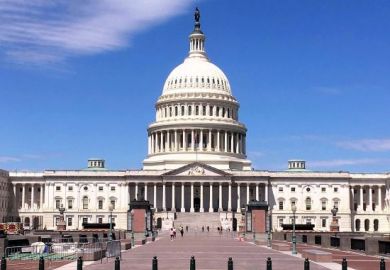The Biden administration’s extended freeze on federal student loan debt – and the prospect of outright forgiveness – has reached the point of threatening quality protections for new students, experts have warned.
The concern stems from a variety of monitoring tools led by one known as the cohort default rate, which reflects the share of an institution’s borrowers considered in good standing on their progress toward loan repayment.
The CDR metric is important for both prospective students and the government to avoid working with low-quality institutions, the Congressional Research Service told lawmakers in a new analysis. The service is the official policy research institute the US Congress, and it reminded the politicians that the CDR is the “primary federal institutional accountability mechanism” tied to student lending.
Yet with interest accumulation and payment requirements on federal student loans suspended since the early days of the pandemic in March 2020, it noted, the CDR measure – already seen as vulnerable to gaming – has disappeared entirely as a useful tool.
“There is a danger from a student protection standpoint,” agreed Kristin Blagg, a senior research associate in the Center on Education Data and Policy at the Urban Institute, a research organisation focused on social equity.
The Biden administration has been taking steps to fill that accountability gap. For the purposes of guiding prospective students, it has been trying to improve the Education Department’s College Scorecard, an online database for comparing institutions and programmes on student outcomes. For the government’s own accountability efforts, it’s been working to restore the federal gainful employment rules, which denied aid to institutions if their former students did not earn enough money to pay back their loans.
In both areas, however, even administration allies agree that it has not made enough progress, raising a risk that it is harming current students while working to forgive the loans of past borrowers.
A new gainful employment rule would do a lot to fill the protective gaps left by the hollowing of the CDR, said Robert Shireman, who served as deputy undersecretary of education in the Obama administration.
But for a variety of reasons, Mr Shireman said, the Biden administration has been slow to write a gainful employment regulation that would replace the original 2014 version, which was cancelled by the Trump administration in 2019.
“We would like to see this administration move faster than it is on its accountability measures, especially gainful employment,” said Mr Shireman, now a senior fellow at The Century Foundation, a progressive thinktank.
The original gainful employment structure applied only to for-profit colleges and non-degree programmes elsewhere. The Biden administration has sought to keep it that way, although Republicans have long argued for any new version to be applied more broadly across higher education.
The College Scorecard, meanwhile, is increasingly improving its accumulation of institutional and programme performance data from a variety of employment records, making the CDR less necessary, Mr Shireman said. He and others, however, have faulted the College Scorecard for an interface that students find fundamentally difficult to use.
Mr Biden was elected in 2020 on campaign promises to forgive $10,000 (£8,000) in college loan debt for all borrowers, and to make two-year institutions available cost-free. Some of his political allies have warned that unilateral forgiveness is regressive, helping wealthier Americans who do not need it.
The idea nevertheless remains politically attractive. Congressional Republicans have a strong chance of recapturing the US House of Representatives in this year’s elections, and their leaders on the chamber’s education committee just issued a legislative proposal to reform the student loan system. It contains a series of debt forgiveness provisions, though with benefits targeted to the financially needy.
Register to continue
Why register?
- Registration is free and only takes a moment
- Once registered, you can read 3 articles a month
- Sign up for our newsletter
Subscribe
Or subscribe for unlimited access to:
- Unlimited access to news, views, insights & reviews
- Digital editions
- Digital access to THE’s university and college rankings analysis
Already registered or a current subscriber?








